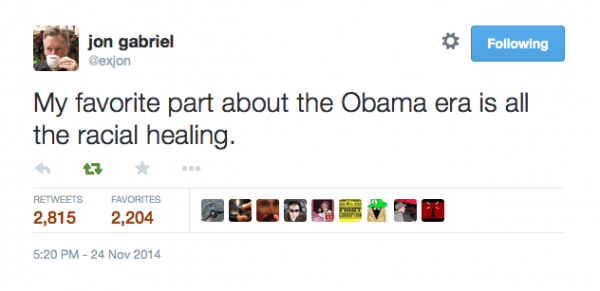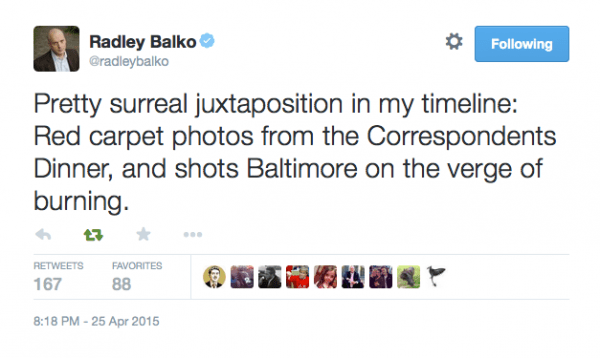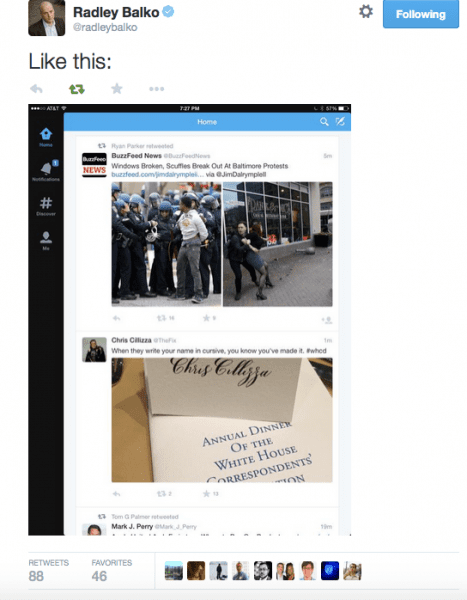SPYING: Google and Facebook Execs Question Government Desire for Encryption Backdoors: Privacy bosses at Google and Facebook say letting the U.S. government unlock encrypted customer data would make law enforcement less accountable. I agree, though I don’t trust Google and Facebook, either.
Archive for 2015
April 26, 2015
ACCULTURATED: Fascism in Our Comics: It’s Not Where You Think.
MICHAEL WALSH: The World Barack Obama and Eric Holder Have Made: Baltimore, 2015. “You voted for it, America. And now you’re going to get it, good and hard.”
IN THE MAIL: From Dr. Tara Palmatier & Paul Elam, Say Goodbye to Crazy: How to Rid Yourself of that Crazy Ex and Restore Sanity to Your Life.
Plus, today only at Amazon: Up to 40% Off Cuisinart Grills.
And, also today only: Graco Highback Turbobooster Car Seat, $28.99 (42% off).
TAXPROF ROUNDUP: The IRS Scandal, Day 717.
DEATH BY A THOUSAND LAWSUITS?: The death penalty may be dying a slow death, by litigation. The Republican-controlled unicameral Nebraska legislature voted 30-13 (with 17 Republican “yes” votes) to repeal that state’s death penalty. The reasons for lost Republican support are varied: the inefficiency (and cost) of years of litigation to carry the penalty out; perceived incongruity with pro-life beliefs; fear of wrongful executions; and a shortage of drugs needed to carry out executions.
The drug shortage is the biggest culprit. The death penalty in most states is carried out by a lethal injection of a three-drug “cocktail”: (1) an anesthetic (to prevent pain); (2) a paralytic (to paralyze); and (3) potassium chloride (which stops the heart). But in early 2011, U.S. drugmaker Hospira announced it would no longer manufacture sodium thiopental, the primary anesthetic used in the lethal injection cocktail.
Hospira’s exit from the market left States scrambling for a substitute, including purchases of the drug from foreign markets. When death penalty lawyers complained that States lacked legal authority to import sodium thiopental from foreign countries, the Obama Administration seized State stockpiles of the drug, claiming its possession violated federal law. States then turned to pentobarbital, manufactured by Danish drug company Lundbeck. But by summer 2011, Lundbeck, too, announced it was denying distribution of the drug to U.S. prisons.
The State of Oklahoma has turned to midazolam hydrochloride as a substitute anesthetic, though it hasn’t specifically been approved by the FDA as such. It is widely used off-label, however, for anxiety and sedation. On Thursday, the Supreme Court will hear an Eighth Amendment challenge, Glossip v. Gross, to Oklahoma’s use of midazolam, which claims that its use constitutes “cruel and unusual punishment” because midazolam isn’t foolproof at inducing unconsciousness.
The Supreme Court has never struck down a specific death penalty method as unconstitutional. Indeed, in 2008, the Supreme Court upheld the constitutionality of a four-drug lethal injection cocktail in Baze v. Rees. The Court suggested, however, that a state may violate the ban on cruel and unusual punishment if it continues to use a lethal injection method, without sufficient justification, in the face of superior alternative procedures. In the Glossip case pending before the Court, therefore, Oklahoma asserts–in an excellent brief authored by Oklahoma Attorney General Scott Pruitt and well-known constitutional lawyer David Rivkin— that the inmate must carry the burden of proving that there are, indeed, superior alternative anesthetics available. They assert:
This Court requires Petitioners to demonstrate the availability of a constitutional alternative method of execution for good reason. Capital punishment is constitutional, and this Court has made clear that States must have a means of carrying it out, even if some pain results as an inescapable consequence of execution. Accordingly, challenges to a method of execution must demonstrate that there exists a feasible alternative method that will result in substantially less pain. Otherwise, a petitioner’s challenge would constitute a challenge to the death penalty itself – an issue foreclosed by the Constitution.
In the event that the Supreme Court uses Glossip to reopen the constitutionality of lethal injection, States are now bringing back older methods of execution including nitrogen gas, the electric chair and firing squad.
States’ adopting a variety of methods is probably the best way to ensure that the death penalty can survive these liberal/progressive “lawfare” tactics.
UPDATE: Midazolam’s use for anxiety and sedation is “on label,” but its use for maintenance of general anesthesia is off-label. It should be noted, however, that off-label uses of all FDA-approved drugs is perfectly legal and indeed, common.
THIS IS A PRETTY SICK BURN AFTER LAST NIGHT’S WHITE HOUSE CORRESPONDENTS’ DINNER: “He spoke dismissively of candidates who surrounded themselves with ‘sycophants’ and bemoaned a culture built around a single person, or even a party. The goal, he stressed, should be about serving the national interest.”
MEGAN MCARDLE: Welfare Reform Was, and Still Is, a Good Idea. Yes, but the Democrats’ political strategy requires a large, dependent, easily-mobilized underclass.
AT AMAZON, fresh deals on bestselling products, updated every hour.
Also, coupons galore in Grocery & Gourmet Food.
Plus, Kindle Daily Deals.
And, Today’s Featured Digital Deal. The deals are brand new every day, so browse and save!
WE CAN’T TALK ABOUT DIVERSITY AROUND PEOPLE WHO ARE DIFFERENT! Anger after white people and men are banned from ‘anti-racism’ rally at British university by its own student union DIVERSITY OFFICER.
A students’ union has been accused of racism and sexism after banning white people and men from an event to promote equality.
Those studying at Goldsmiths, University of London, were invited to the students’ union meeting to discuss ‘diversifying the curriculum’.
But they were shocked when an organiser told white people and men ‘not to come’ as it was only open to BME [black and minority ethnic] women.
The union eventually backed down after a backlash from students, one of whom described the exclusive policy as ‘patronising beyond belief’.
The event, held on Wednesday, was organised by welfare and diversity officer Bahar Mustafa, who said she hoped to persuade academics to broaden courses to include more material relating to minority groups.
Fire her.
THOUGHTS ON UVA AND CAMPUS SEX CULTURE. I’m not convinced that campus sex culture is all that bad — though this piece seems to think otherwise, there are actually fewer sexual assaults on campuses than off — but the hypocrisy and ideological maneuvering of colleges on the subject is pathetic.
FLASHBACK: With so Many Red Flags, Why Isn’t the IRS Auditing the Clinton Foundation? Probably the same reason they’re giving Al Sharpton — and, apparently, the entire on-air staff of MSNBC — a pass.
HIGHER EDUCATION BUBBLE UPDATE: How To Save American Colleges.
With acceptance letters in hand, millions of high-schools seniors ruminating over where to attend college—and their parents who are panicked that their kid might pick the place with the best climbing wall—should all take a breath: It doesn’t much matter where you go to college.
What matters is “how you go,” says Purdue University President Mitch Daniels, the former governor of Indiana. He then lays out the results of the Gallup-Purdue Index, a national survey of 30,000 college graduates that was first released last year. The survey attempts to quantify not only what graduates earn but also how well they are navigating adult life.
A mere 39% of college graduates report feeling engaged with their work, and in that group as many hail from top-100 schools as don’t. The three most important contributions that college makes to a sense of workplace thriving after graduation: Having one professor who made you excited about learning, feeling as though teachers cared about you, and working with a mentor. Graduates who checked those boxes were more than twice as likely to sense they are flourishing at work.
But only 14% of those surveyed said they had hit that trifecta in college. Other positive factors from undergraduate experience: working on a long-term project, having an internship and participating in extracurricular activities. Where graduates went to college barely registered as a predictor of job satisfaction.
This surprises me not at all. But there’s more:
That was two years ago, soon after Mr. Daniels arrived at Purdue. His first order of business: freeze tuition.
“I had a sense, first of all, it seemed like the right thing to do. Not to skip over that. But secondly that we probably could do it without great difficulty,” he says. For decades college tuition has outpaced inflation, forcing students to increase their borrowing, but next year’s Purdue seniors will have never seen a tuition increase.
“I thought this whole process—it’s sort of like a bubble, and people are using that term—just couldn’t go on much further, and so why not get off the escalator before it broke,” he says.
Not many colleges have followed, and Mr. Daniels has a few theories about why. “Corporate boards 15 years ago or so were roundly and rightly criticized for being too compliant with the desires of management. If this was true of corporate boards, I think it’s really been true of a lot of college boards and trustees,” he says. “They have such an affection for dear old alma mater, love those 50-yard-line seats, ‘Whatever you want to do, Mr. President.’ And so it’s been observed a long time that colleges will spend everything they can get their hands on, in the absence of either market pressure or stewardship by a strong-minded board.”
There is also what he considers an “insidious” idea that “if we don’t raise our price, people will think we don’t have confidence in our product.” He points out that “in the absence of proof, people assume a higher price must be a better product or education.” But according to data released last year, half of high-school seniors accepted by their first-choice college attended a different school, and most cited cost as the reason.
The jig is about up. And the many people worried about CEO pay being too high because the board is too close to the CEO might look more closely at higher education, and the nonprofit world in general.
Related: A Degree Signifying Nothing?
The American Council of Trustees and Alumni (ACTA) has released a report titled “The Unkindest Cut: Shakespeare in Exile 2015.” According to the report’s author, Dr. Michael Poliakoff, only 4 out of the top 52 liberal arts colleges and universities in the country require English majors to take a course on Shakespeare. “If reading Shakespeare is not central to a liberal education, what is? For English majors to miss out is far worse. A degree in English without serious study of Shakespeare is like a major in Greek Literature without the serious study of Homer. It is tantamount to fraud. A department that claims to cover the full span of literature written in English and represent the highest standards of academic study cannot marginalize the writer most honored and beloved in English literary history,” writes Poliakoff. The report notes that, while many colleges are giving Shakespeare superficial treatment, trendy courses, and even courses that focus on the works of children’s book authors, are growing in number. As ACTA’s president Anne Neal said in a recent interview, “It’s no wonder that the public is rapidly losing faith in our colleges and universities.”
Well, no, it isn’t.
April 25, 2015
JOURNALISM: CNN To Viewers: Check Twitter If You Want The News. “The most powerful man in the world is going to tell some jokes.”
Related: Rioting In Baltimore While ‘Nerd Prom’ Rages 40 Miles Away In DC.
UPDATE: From the comments: “Student Council wannabes are not nerds.”
ANOTHER UPDATE: Salena Zito: Elites, Media, And Character.
THE PERSISTENCE OF JOHN DENVER among the Japanese. Love the pic. I had dinner with John Denver at some National Space Society thing or other, and what struck me most was that he was buff. I remembered the skinny fellow from the 1970s, but he had become much more muscular. He knew a lot about space, too, of course.
WHILE BALTIMORE SAW VIOLENT RIOTS OVER POLICE BRUTALITY, folks in the Capital District were walking the Red Carpet and ignoring the National Anthem at the White House Correspondents’ Dinner. “No one is allowed to leave Oriole Park at Camden Yards. There are at least 15,000 people trapped in the stadium.”
UPDATE: Emblematic.
ANOTHER UPDATE: Yep.
MORE: This is evergreen:
Plus:
Thronesniffers rejoice in being close enough to smell it.
PUNCHING BACK TWICE AS HARD: Honey Badgers, Expelled From Calgary Expo For Questioning Feminism, Seeking Legal Redress.
Is there a Canadian lawyer interested in getting involved?
IF YOU DEMONIZE PEOPLE AT EVERY OPPORTUNITY, THEY MAY GROW LESS LIKELY TO VOTE FOR YOU: The Democrats’ White-Voter Problem, In Two Maps.
THE PHENOMENON OF Mayonnaise Loyalty.
FIGHT THE POWER: Laverne Cox Gets Naked, Exposes Radical Feminist Exclusionism. “Feminist Meghan Murphy reacted to the photo just as Cox suggests that people often react to black and trans women — with disgust, prejudice and horror. . . . That coldness isn’t new. Ideally, you’d hope, feminism would be about fighting for the rights of all women and trying to free all people from oppressive gender stereotypes. In practice, though, the radical feminist tradition of Andrea Dworkin and Janice Raymond, who Murphy champions, has often built itself on exclusion rather than inclusion. Radical feminism’s radicalism is often defined by smearing other women. . . . The logic that led 19th century white feminists to push for votes for white women alone is still, painfully, visible in Murphy’s attack on Cox. Some women are not worthy of kindness, of love or of sisterhood.”
WHEN AMERICA SLIPS BEYOND PARODY: Bill Clinton’s Wife Condemns ‘Scourge Of Sexual Assault’ In First Big Speech.
THE PROBLEM WITH “THE SOCIALIST IMPULSE TO CLASSES VERSUS THE CAPITALIST FOCUS ON THE INDIVIDUAL,” courtesy of Prof. Russ Roberts: “Once you begin to see humans as the interchangeable members of a class, you begin to dehumanize them.”
To the political class, that’s not a bug, but a feature, since you can get away with a lot more.





